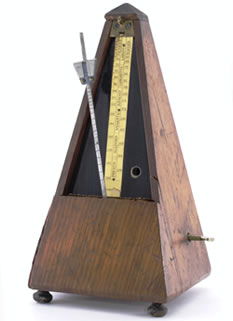A bit of Research: The ability of Adults with ADHD to maintain a rhythm with a faster or slower tempo
 Here is an interesting study by Gilden and Marusich (2009) published in Neuropsychology that looked at the ability of adults with ADHD to maintain a rhythm with either a faster tempo (less demand on focus, self-control, and working memory) or a slower tempo (more demand on focus, self-control, and working memory). Persons with ADHD had MUCH more difficulty when the tempo was slower, requiring them to estimate a longer time interval between beats, maintain the time interval in their memory, and restrain themselves from hitting too soon. This study, like many others, points to the direct relationship between timing in the brain and its command center “working memory.” Researchers theorize that Interactive Metronome is affecting this critical “control center” for timing in the brain and thereby improving many of the time-related symptoms of ADHD.
Here is an interesting study by Gilden and Marusich (2009) published in Neuropsychology that looked at the ability of adults with ADHD to maintain a rhythm with either a faster tempo (less demand on focus, self-control, and working memory) or a slower tempo (more demand on focus, self-control, and working memory). Persons with ADHD had MUCH more difficulty when the tempo was slower, requiring them to estimate a longer time interval between beats, maintain the time interval in their memory, and restrain themselves from hitting too soon. This study, like many others, points to the direct relationship between timing in the brain and its command center “working memory.” Researchers theorize that Interactive Metronome is affecting this critical “control center” for timing in the brain and thereby improving many of the time-related symptoms of ADHD.
Gilden, D.L. and Marusich, L.R. (2009). Contraction of Time in Attention-Deficit Hyperactivity Disorder. Neuropsychology, 23(2), 265-269.

 Some parents have asked me if they could just use a regular musical metronome and get the same results as Interactive Metronome at home or IM-Home. A standard metronome is typically used by musicians to help them practice the tempo of music. They have also been used in traditional therapy to help patients with their timing and rhythm, however there is one piece that is missing. – FEEDBACK!
Some parents have asked me if they could just use a regular musical metronome and get the same results as Interactive Metronome at home or IM-Home. A standard metronome is typically used by musicians to help them practice the tempo of music. They have also been used in traditional therapy to help patients with their timing and rhythm, however there is one piece that is missing. – FEEDBACK! I have had the opportunity of working with many children who are diagnosed with PDD. The diagnosis in general seems to have a very wide range of abilities and areas that are affected. I have found in my area (Northeastern part of the country), that these children seem to fall somewhere between those who are diagnosed with Autism, and those diagnosed with Aspergers Syndrome. So their responses to using the Interactive Metronome have been very similar, with great progress in a shorter amount of time.
I have had the opportunity of working with many children who are diagnosed with PDD. The diagnosis in general seems to have a very wide range of abilities and areas that are affected. I have found in my area (Northeastern part of the country), that these children seem to fall somewhere between those who are diagnosed with Autism, and those diagnosed with Aspergers Syndrome. So their responses to using the Interactive Metronome have been very similar, with great progress in a shorter amount of time. Some of my patients are very sports oriented. When we start IM, I tell them all about how professional sports teams such as the Miami Dolphins or the golf pro ViJay Singh use IM as part of their training to improve and enhance their performance. Every once in a while, I get a patient who just really “gets on a roll” and makes improvements very quickly earning lots of “bursts” (so many consecutive super right on the beat hits).
Some of my patients are very sports oriented. When we start IM, I tell them all about how professional sports teams such as the Miami Dolphins or the golf pro ViJay Singh use IM as part of their training to improve and enhance their performance. Every once in a while, I get a patient who just really “gets on a roll” and makes improvements very quickly earning lots of “bursts” (so many consecutive super right on the beat hits).